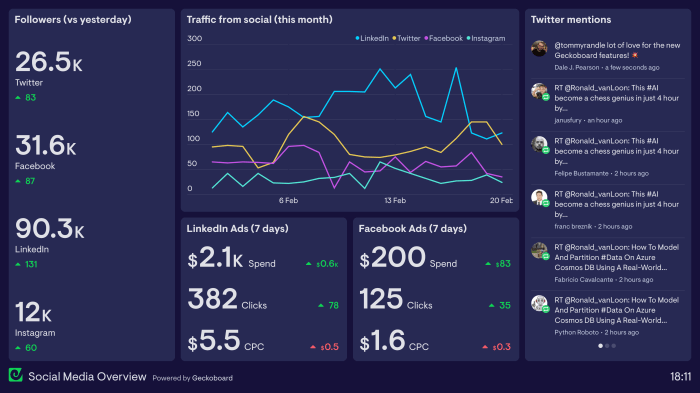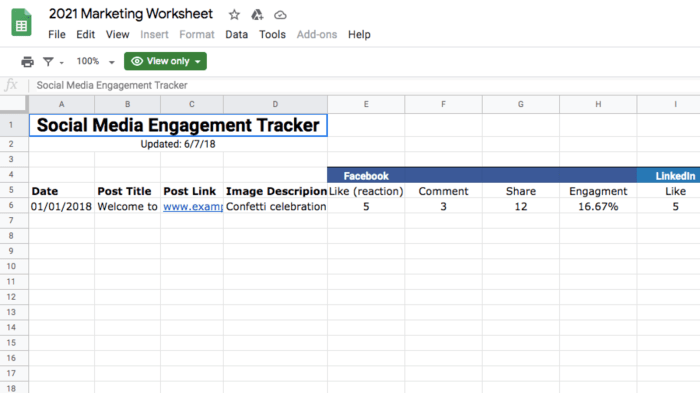Tracking Social Media Engagement sets the stage for enhancing business impact through strategic online interactions. Dive into the realm of metrics, tools, and strategies that can revolutionize your digital presence.
Importance of Tracking Social Media Engagement
Tracking social media engagement is essential for businesses to understand their audience, optimize their marketing strategies, and improve brand visibility. By monitoring metrics such as likes, shares, comments, and click-through rates, companies can gain valuable insights into the effectiveness of their social media campaigns.
Enhanced Marketing Strategies
Tracking social media engagement can help businesses identify which content resonates most with their target audience. By analyzing the performance of different posts, companies can refine their messaging, timing, and visuals to maximize engagement and reach. For example, if a certain type of post consistently receives high engagement, businesses can tailor future content to align with that successful format.
Impact on Brand Awareness and Customer Loyalty
Engagement on social media platforms plays a crucial role in building brand awareness and fostering customer loyalty. When followers actively engage with a brand’s content by liking, sharing, and commenting, they help increase visibility and reach among their own networks. This organic word-of-mouth promotion can lead to higher brand recognition and trust among consumers, ultimately driving customer loyalty and repeat business.
Metrics for Tracking Social Media Engagement

When it comes to tracking social media engagement, there are several key metrics that are commonly used to measure the success of a social media campaign. These metrics help businesses understand how their audience is interacting with their content and provide valuable insights for future strategies.
Key Metrics for Tracking Social Media Engagement
- Likes: This metric indicates how many people have shown appreciation for your content by liking it. It reflects the level of positive reception from your audience.
- Shares: The number of times your content has been shared by users. This metric shows how engaging your content is that people are willing to share it with their own followers.
- Comments: Comments on your posts provide direct feedback from your audience. They can indicate interest, questions, or even criticisms that can help you tailor your content better.
- Click-through Rate (CTR): This metric measures how many people clicked on a link included in your post. It shows the effectiveness of your call-to-action.
Engagement Metrics vs. Reach and Impressions
While reach and impressions are important metrics for understanding the potential audience exposure, engagement metrics focus on the actual interactions and reactions from the audience. Reach refers to the number of unique users who have seen your content, while impressions represent the total number of times your content has been displayed, regardless of unique users.
Significance of Engagement Rate
The engagement rate is a crucial metric in analyzing social media performance as it provides a more in-depth view of how well your content resonates with your audience. It calculates the percentage of people who engaged with your content relative to the total number of people who saw it. A high engagement rate indicates that your content is compelling and relevant to your audience, leading to increased brand awareness and loyalty.
Tools and Platforms for Tracking Social Media Engagement

Tracking social media engagement is crucial for businesses to understand their audience and improve their marketing strategies. There are several tools and platforms available to help businesses track their social media performance and engagement. Let’s explore some popular options and compare their features.
Social Media Analytics Tools
- Sprout Social: This platform offers in-depth analytics, social listening, and publishing tools to help businesses track their social media engagement across multiple platforms.
- Hootsuite: Hootsuite provides analytics reports, scheduling features, and social listening capabilities to monitor audience engagement and track key metrics.
- Buffer: Buffer is known for its simple and user-friendly interface, offering analytics, scheduling, and engagement tracking tools for businesses of all sizes.
- Google Analytics: While not specific to social media, Google Analytics can be used to track website traffic from social media platforms and measure the impact of social media campaigns.
Choosing the Right Tool, Tracking Social Media Engagement
- Consider the size and needs of your business: Choose a tool that aligns with the scale of your social media presence and the level of analytics you require.
- Features and capabilities: Look for tools that offer a range of analytics metrics, social listening capabilities, and reporting features to provide a comprehensive view of your social media engagement.
- Integration with other platforms: Select a tool that can integrate with other marketing platforms or tools you already use to streamline your analytics and reporting processes.
- User-friendliness: Opt for a tool that is easy to use and understand, ensuring that your team can effectively utilize the analytics and insights provided.
Strategies to Improve Social Media Engagement
To enhance social media engagement with your followers, it is crucial to implement effective strategies that encourage interaction, increase brand awareness, and build a strong community. By focusing on creating quality content and leveraging user-generated content, you can significantly boost engagement levels on your social media platforms.
Quality Content Creation
Creating high-quality and valuable content is essential to capturing the attention of your audience and keeping them engaged. Share informative posts, visually appealing images, engaging videos, and relevant updates that resonate with your followers. Consistency in posting and maintaining a unique brand voice will also help in establishing a loyal following.
Leveraging User-Generated Content
User-generated content, such as reviews, testimonials, and customer photos, can be a powerful tool for enhancing social media engagement. Encourage your followers to share their experiences with your brand and showcase their content on your platforms. This not only fosters a sense of community but also increases trust and credibility among your audience.